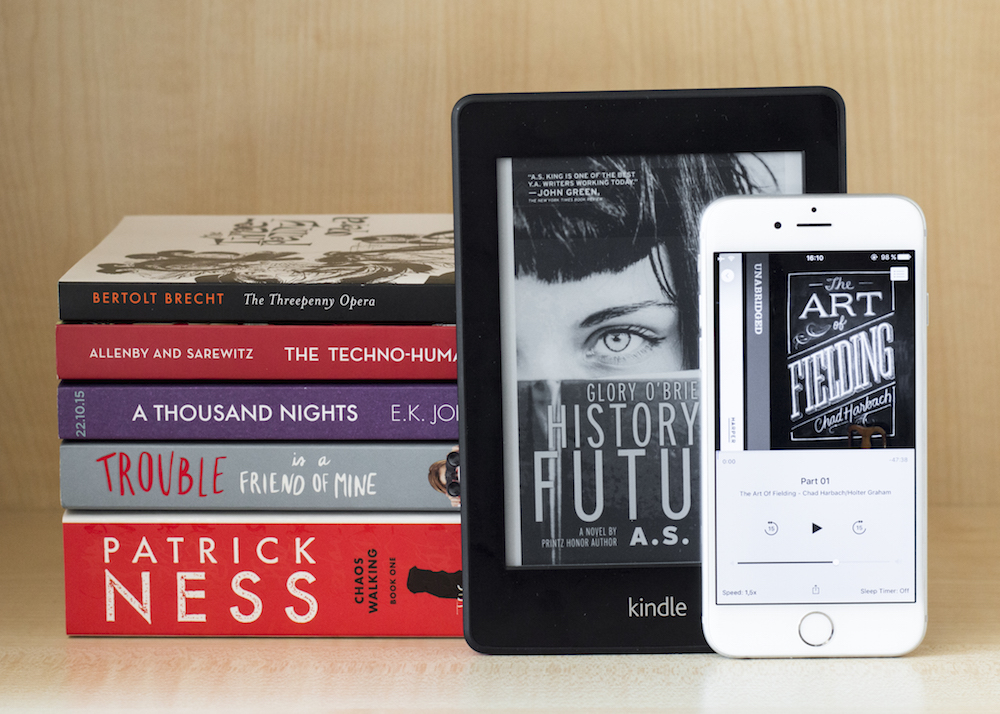
Deciding what to pack on travels often ends in debates on what must come along and what can stay home. Paying for excess baggage usually isn’t worth the extra cost. For bibliophiles, it’s all the tougher because books are some of the densest objects in our suitcases. After struggling through this predicament for the second time this year, I decided to share my process.
Print Matter
Paperbacks over Hardcovers
As tempting as it might be to pack the entire bookshelf, we all know that’s not going to work. Well, unless you’ve got a Mary Poppins bag. The rest of us have to weigh our options carefully in order to travel as light as possible. The first course of action is to ditch hardcovers. Go with paperbacks. They add less bulk than hardcovers.
Not All Paper is Equal
Blindly grabbing paperbacks from the shelves could still result in an overweight suitcase. It’s important to consider the size of the paperbacks and the paper they’re bound with. Trade paperbacks can be fairly big and while the quality of the binding makes them sturdy, the paper tends to be heavy. Try to stick to standard paperbacks or take along mass paperbacks if you don’t mind the small print (I do mind).
Digital Content
The beauty of ebooks is that each additional one loaded on an e-reader adds weight down to nanograms. In other words, it’s possible to carry a thousand ebooks without worrying about baggage allowance. This makes ebooks perfect for travel. Audiobooks too are a great choice of format, especially since they can be easily loaded on smartphones that most of us carry anyway.
Ensure Offline Access
Before leaving for your trip, ensure all content is available for offline reading. Download all content at home where there’s wifi access, so there won’t be a need to waste precious mobile internet data. Downloading an audiobook could eat away 300mb of data; not so ideal if data’s capped at 2GB or less on our travels.
Library & Subscription Services
Borrowing ebooks and audiobooks from digital lending services like Overdrive and Onleihe can save a lot of money which makes them such great services. What’s frustrating is when a loan period ends right then when you get to a good part and have no way of accessing the Internet to re-borrow the ebook. One way to prevent that is to select the maximum loan period your library allows. If there’s a renewal option, be sure to use it.
Scribd and Kindle Unlimited (Oyster is shutting down) are different in that aspect because there’s no fixed loan period per ebook. Instead, there’s a cap on how many books can be on loan at any one time. Scribd allows 20 concurrent offline titles on a device. Kindle Unlimited allows 10 check-outs at any one time. Just be sure to download your loans for offline access.
Order of Importance
Determine which titles have priority over others. In my stack of books, two are review copies. Both book reviews should be up on the blog this month. That means I need to finish reading them soon too. Similarly, if you have to work through reading lists, books on those lists have priority. Start with high priority books before allowing your whims and fancies to take over.
Consider Time
Lastly, it helps to consider how much time you will have to read when you travel. How long are your flights? How much time will you spend in trains? Factor in the period of your travel and how much down time you will have. Packing reading material in relation to your time is a good way to avoid overpacking and might even clear space for souvenirs, if you intend to bring home any.

Whenever I travel anywhere, I make sure to carry my kindle e-reader along. It keeps me busy and refreshing along the journey. Thanks for sharing this information…
I love the tips you’ve shared for choosing what reads to take along when you travel! My system for picking reads to travel with is eerily similar, so I love how you’ve laid it out here.
These are great tips, Josephine! I would say that if the person doesn’t want to bring physical books, they should definitely invest in an e-reader. (It’s beneficial for any type of situation.)
When I travel long distance, I tend to only bring my Kindle because I weirdly end up not reading those books. (I guess the choice is too final for me.)
I rarely ever read on travels, so the most I do is bring one book, and then my phone. I’m just generally always so busy when I’m traveling to read. >.<